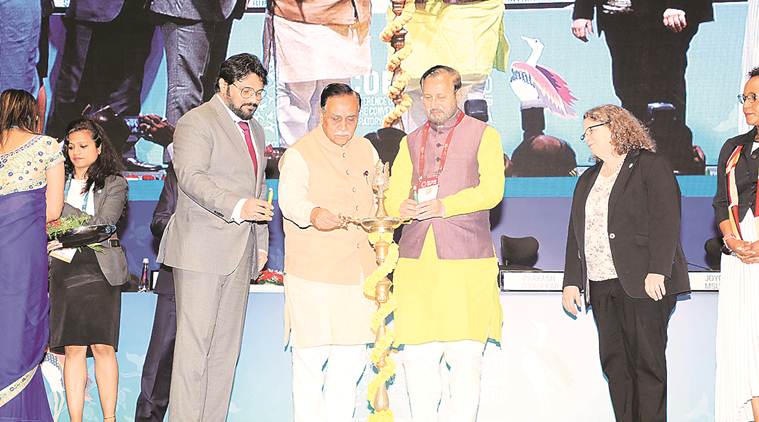 Gujarat Chief Minister Vijay Rupani and Union Minister of Environment Prakash Javadekar in Gandhinagar. (Express photo)
Gujarat Chief Minister Vijay Rupani and Union Minister of Environment Prakash Javadekar in Gandhinagar. (Express photo)
Even as the United Nations 13th Conference of the Parties to the Convention on Conservation of Migratory Species of Wild Animals (CMS COP13) in Gandhinagar is poised to discuss an Indian proposal to include the critically endangered species, Great Indian Bustard (GIB), in the Appendix I of the convention, Pakistan, which is also a range country of the bird, has so far remained absent from the global meeting. Pakistan is not only habitat of GIB, but also one of the 130 parties to the convention.
Replying to a query from The Indian Express, media coordinator for the convention, Florian Keil, said that so far, Pakistan has not shown up for the convention. “At the moment, no representative from Pakistan… Pakistan has registered, but they are definitely not here. And as Secretariat, we don’t have any information as to why or why not,” said Keil.
Keil added that there are delegations who sometimes don’t show up. And in the current convention also, out of the 130 party countries, 78 were present Monday.
Inspector General of Forests, Ministry of Environment, Forest & Climate Change, Soumitra Dasgupta, said that current population of GIB in India is believed to be around 175 individuals inhibiting in five states that include Rajasthan, Karnataka, Andhra Pradesh, Maharashtra and Gujarat. Out of the five states, he added, Rajasthan has the biggest population of the bird at around 150. In Gujart and Maharashtra, Dasgupta added, the situation is not very good with only 7-8 birds left. In Karnataka around 12 individuals have been identified.
Dasgupta said that one of the major reasons for GIB becoming endangered are habitat degradation and hunting in the neighbouring Pakistan.
At a press conference after the inaugural session of the convention, replying to queries if the CMS or India will talk to Pakistan on banning hunting of GIB, Executive Secretary Amy Fraenkel said that Pakistan is one of the 130 parties to the CMS while implying that conservation of the GIB will be binding upon Pakistan if it gets listed on the Appendix I of the Convention.
Meanwhile, India has already launched a plan for the conservation of four endangered species in the country that include dugong, dolphin, dancing deer and GIB. Dasgupta said that the project has been initiated in partnership with the Wildlife Institute of India (WII) with total budget of Rs 100 crore which has been allocated from the fund of Compensatory Afforestation Fund Management and Planning Authority (CAMPA).
“Out of those Rs 100 crore, Rs 30 crore have been earmarked for the conservation of GIB,” Dasgupta said.
When asked if absence of Pakistan from the convention will affect the conservation efforts for GIB, Dasgupta replied in negative and said, “Once GIB is listed in the Appendix I of the Convention, it will be expected that Pakistan bans hunting of GIB. If they don’t, then they will be questionable on international conventions.”
He also stated that the inclusion of GIB in the Appendix I of CMS will be a multilateral decision with participation of so many party countries. He added that United Nations sends invitation to the partner countries for the convention and if they do not come, nobody can help it.